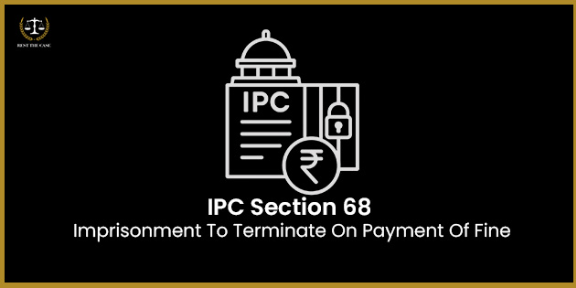IPC
IPC Section 68 - Imprisonment To Terminate On Payment Of A Fine

In many criminal cases, courts impose both a fine and imprisonment, or impose imprisonment in default of fine. But what happens if someone pays the fine while serving the default sentence? The answer lies in Section 68 of the Indian Penal Code (IPC). This provision plays a vital role in protecting the rights of an accused by allowing their imprisonment to end as soon as the fine is paid.
What We’ll Cover in This Blog
- The legal text and meaning of IPC Section 68
- How it connects to other sections like 63, 64, 65, and 67
- What it mean in practical scenarios
- Judicial interpretation
- Its relevance in the modern legal system
- Common questions answered
What Is IPC Section 67?
Legal Text of IPC Section 68
Section 68: Imprisonment to terminate on payment of fine
The imprisonment which is imposed in default of payment of a fine shall terminate whenever that fine is either paid or levied by process of law.
Simplified Explanation
If a person has been imprisoned because they failed to pay a fine, that imprisonment will end immediately once the fine is paid or recovered through legal means (like attachment of property or salary deduction).
This section gives the right to redemption, ensuring the person does not stay in jail longer than necessary.
Practical Example
Suppose the court fines Ramesh Rs 2000 and states that if he does not pay, he will serve 3 months of simple imprisonment under Section 67. If Ramesh fails to pay and is imprisoned, but manages to arrange the money 30 days later, he can be released immediately after the fine is paid, thanks to Section 68.
Purpose of IPC Section 68
- Ensures that imprisonment is not used as excessive punishment
- Gives the offender an opportunity to rectify the default
- Maintains a balance between punishment and fairness
- Reduces the burden on prison infrastructure
- Promotes reform over prolonged detention
How It Works with Other Sections
- Section 63 defines the amount of the fine
- Section 64 allows imprisonment if the offence carries both a fine and imprisonment
- Section 65 limits default imprisonment when both punishments are given
- Section 67 covers default imprisonment for fine-only offences
- Section 68 allows that imprisonment to end on payment of a fine
Thus, Section 68 acts as a safety valve within the sentencing framework.
Judicial Interpretation
Courts have repeatedly upheld that default imprisonment is not a substitute for punishment but a means to ensure payment. The moment the fine is paid, the purpose of the imprisonment is fulfilled.
In the case of Shaik Khader v. State of Andhra Pradesh, the High Court emphasized that continuing imprisonment after payment of a fine would violate the liberty of the individual.
Modern Relevance
Even today, IPC Section 68 is relevant in cases involving:
- Minor offences where fines are levied
- Traffic and municipal offences
- Criminal breach of trust with fine components
- White-collar crimes where fines are significant
This provision ensures that default imprisonment remains a temporary coercive tool, not a permanent punishment.
Conclusion
IPC Section 68 is an important provision that ensures fairness and flexibility in sentencing. It gives the convict an opportunity to end their imprisonment by paying the fine, promoting reformative justice over rigid punishment. It also reflects India’s commitment to the idea that liberty must not be restricted more than necessary, especially when the purpose of the law has already been fulfilled.
Frequently Asked Questions
Q1. Can a person be released midway through imprisonment if they pay the fine?
Yes, as per Section 68, imprisonment ends the moment the fine is paid or recovered.
Q2. Does this apply to both simple and rigorous imprisonment?
Section 68 applies to imprisonment in default of fine, which is typically simple imprisonment under Sections 64 to 67.
Q3. Can a person be forced to stay in jail even after paying the fine?
No, continued imprisonment after payment would be illegal and can be challenged in court.
Q4. Can the fine be paid by someone else on behalf of the convict?
Yes, a relative or friend can pay the fine to secure the convict’s release.
Q5. Is there any process for automatic release once the fine is paid?
Yes, once payment is confirmed by the court or jail authorities, the person must be released immediately.






